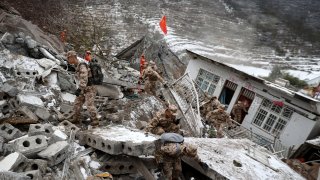
A landslide buried 47 people in a remote village in mountainous southwestern China on Monday, state media said. Hours later, two survivors were rescued amid freezing temperatures and falling snow.
The disaster struck just before 6 a.m. in the village of Liangshui in the northeastern part of Yunnan province. By evening, nine bodies were retrieved and about 500 people were evacuated from the area.
Watch NBC6 free wherever you are
Rescue crews continued to try and find victims who were buried in about 18 homes, the Zhenxiong county publicity department said. Reports said eight of the bodies were from the group that was initially buried by the landslide but did not say where the ninth body was found.
The cause of the landslide wasn’t immediately known as survivors and rescuers struggled with snow, icy roads and freezing temperatures that were forecast to persist for at least the next three days.
Get local news you need to know to start your day with NBC 6's News Headlines newsletter.
Luo Dongmei, 35, was sleeping when the landslide struck, but she survived and was relocated to a school building by local authorities.
“I was asleep, but my brother knocked on the door and woke me up. They said there was a landslide and the bed was shaking, so they rushed upstairs and woke us up,” Luo said.
Luo, her husband and their three children, along with many other residents, have been provided with food at the school but are still waiting for blankets and other protection from the cold weather, she said.
U.S. & World
Luo said she's been unable to contact her sister and aunt, who lived closer to the site of the landslide. “The only thing I can do is to wait,” she said.
State broadcaster CCTV put the death toll at nine by 6 p.m., roughly 12 hours after the disaster struck. Zhengxiong county lies about 2,250 kilometers (1,400 miles) southwest of Beijing, with altitudes ranging as high as 2,400 meters (7,900 feet).
Heavy snow has struck many parts of China, causing transportation chaos and endangering lives.
Last week, rescuers evacuated tourists from a remote skiing area in northwestern China where dozens of avalanches triggered by heavy snow had trapped more than 1,000 people for a week. The avalanches blocked roads, stranding both tourists and residents in a village in Altay prefecture in the Xinjiang region, close to China’s border with Mongolia, Russia and Kazakhstan.
Landslides, often caused by rain or unsafe construction work, are not uncommon in China. At least 70 people were killed in landslides last year, including more than 50 at an open pit mine in China's Inner Mongolia region.
In all, natural disasters in China left 691 people dead and missing and last year, causing direct economic losses of about 345 billion yuan ($48 billion, according to the National Commission for Disaster Reduction and the Ministry of Emergency Management. Meanwhile, the Ministry of Natural Resources enacted emergency response measures for geological disasters and sent a work team of experts to the site.
Minister of Emergency Management Wang Xiangxi has traveled to the landslide site to guide rescue operations, according to a statement from the ministry.
The landslide came just over a month after China’s most powerful earthquake in years struck to the northwest in a remote region between Gansu and Qinghai province. At least 149 people were killed in the 6.2-magnitude temblor that struck on Dec. 18, reducing homes to rubble and triggering heavy mudslides that inundated two villages in Qinghai province.
Nearly 1,000 people were injured and more than 14,000 homes were destroyed in what was China’s deadliest earthquake in nine years.
This story is developing, check back for more updates.



